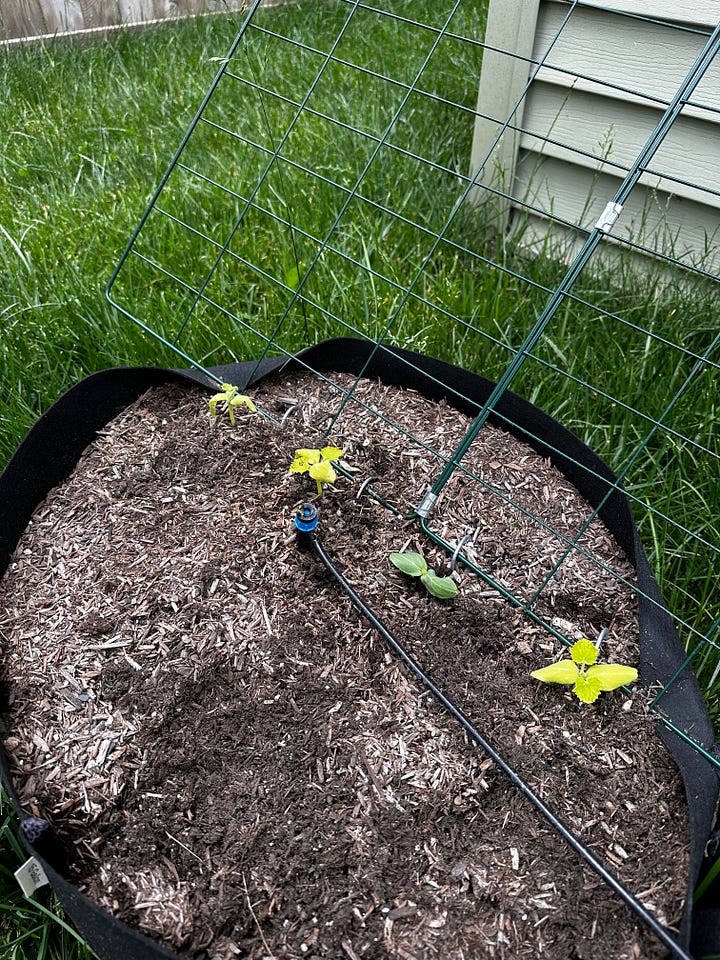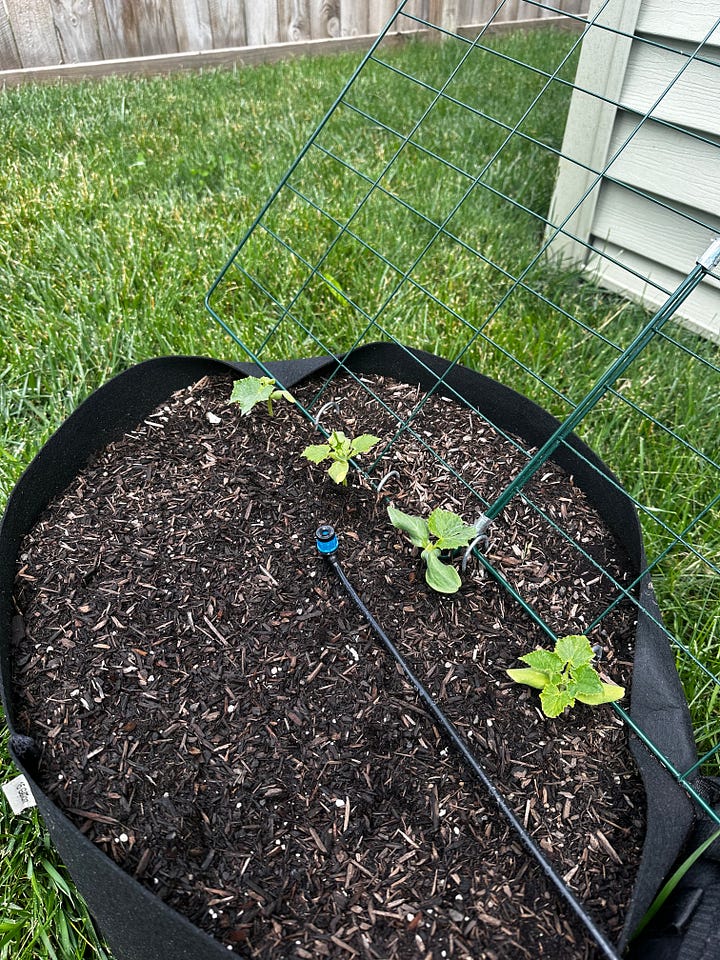I thought I had set up my lemon cucumbers for success. The trellis was set up, they were positioned for full sun all day, and my sprinkler system was programmed to run twice daily.
Yet, after sprouting, my cucumbers languished for over two weeks. They became increasingly yellow and failed to grow in size or produce leaves. I thought I had done everything right, but my cucumbers still suffered.
That’s when I learned about the importance of nitrogen in the soil. Nitrogen is essential for photosynthesis; without it, plants cannot grow or thrive. I have discovered that there are at least two ways that nitrogen may be leached from the soil.
The first is after heavy watering or rainfall. Water is also essential for plant growth, but too much water can oversaturate the soil and deplete the nitrogen plants need to grow.
The second cause of nitrogen loss in soil is when too much organic matter is mixed in with the dirt, such as mulch, bark, or leaves. Nitrogen is needed to break this material down and thus is taken away from plants growing in the soil.


This second cause of nitrogen loss afflicted my plants. The soil I purchased from Lowe’s has a high mulch content. Once it breaks down, it will be great soil for my garden in future years! But right now, it is stealing nutrients from my garden plants.
Fortunately, organic nitrogen fertilizers can be added to the soil. I added one such fertilizer to my garden on Saturday, and by Tuesday, the color had returned to my cucumber sprouts, which were well on their way to sprouting several new leaves. The problem was not in the seed, the plant, or the environmental conditions.
The problem was the soil; once I attended to it, my plants thrived.
Jesus the Gardener
Jesus seemed to know a good deal about gardens. He often spoke of seeds, soil, vineyards, fields, and harvests. It is not difficult to imagine that Jesus enjoyed working his hands in soil and cultivating gardens in the creation he had made.
In one of his more well-known parables, Jesus compared different responses to his Word to different soil conditions (Luke 8:1-15). When the seed of the Word falls on good soil it yields a crop that is far greater than what was sown (Luke 8:8). Those with a receptive heart believe the gospel and obey His Word.
Other soil conditions, however, prevent the Word from bearing any fruit. People will not respond in faith and obedience when the Word falls on a worn path, rocky soil, or among thorns. Instead, they will be oppressed by the devil (8:12), they will believe for a short time and then fall away (8:13), or they will be choked out by the cares of this world (8:14).
In the context of Luke 8, Jesus’ main point of this parable seems to be that we pay close attention to how we hear and respond to God’s Word. Those who hear the Word and retain it produce a good crop (8:15). Those who carefully listen to God’s Word will receive greater degrees of faith and truth (8:18). Those who hear God’s Word and put it into practice are a part of Jesus’ family (8:21).
At the same time, Jesus’ illustration of different soil conditions also invites us to consider how we help people hear and receive the Word rightly. Those who proclaim the gospel with wisdom attend to soil conditions and the seed being sown. If someone is beaten down, a minister of the gospel cares for their practical needs and helps sustain them to hear the gospel. If rocks or thorns, objections or idols, prevent someone from responding to the gospel in faith, wise gospel ministers can clear these obstacles to make way for the seed of the gospel to grow.
The Soil Conditions in the Urban Context
We are also invited to consider other soil conditions that may prevent people from rightly hearing or responding to the gospel. In the urban context, the spiritual soil is often similar to the physical soil in my garden. Conditions allow for seeds of faith to take root and sprout, but the spiritual resources for faith to grow and establish itself are lacking. Faith might take root, but it doesn’t grow and bear fruit. Often, it withers and, ultimately, dies.
Like my garden, spiritual nutrients in the urban context may be depleted for at least two reasons. Just as too much water can oversaturate my garden soil, too much generic spiritualism can oversaturate the spiritual soil of the urban context. Christianity is confused for a kind of spiritualism that is easily summarized by platitude and cliché. While we want to see faith in Christ boost self-confidence, spirituality in the urban context is often reduced to a kind of deism with a Christian twist. Many people profess some kind of faith, but Jesus, his gospel, and knowledge of the Scriptures are often completely missing.
The challenge of gospel ministry in this context is distinguishing Jesus from generic spirituality. Thinking they already have faith or know what Christianity is about, many people will hear His Word through their oversaturated experience. Like a plant that lacks the nutrients to grow or thrive, many people in the urban context need to be shown how to root themselves in Jesus rather than feel-good spirituality that bears little fruit.
Spiritual resources in the urban context may also be depleted by how much attention is taken up by legalism and false teaching. My cucumbers could not grow when all the nitrogen was being sucked up by mulch in the soil. Within the urban context, a great deal of spiritual energy is taken up by the presence of legalism and false teaching. As a result, shame, guilt, and confusion remain obstacles that prevent the gospel from taking root and flourishing in people’s lives.
For example, distorted doctrines of God confuse God for a power to experience rather than a person to know and relate to. There is no longer freedom in a gospel of “by grace and through faith alone” (Ephesians 2:8-9). Instead, there are processes of salvation that include faith alongside other salvific works. Religiosity and legalism are exchanged for life in the fullness of Christ’s love and grace.
Many people in the urban context might talk about Jesus, but do they really know him? When faith is confused for power, grace for works, and legalism for obedience, the spiritual soil of the urban context lacks the “nutrients” for true faith to grow and produce fruit.
What does this mean for gospel ministry in the urban context? We might think we must innovate new, creative ways to proclaim the gospel. But as the Ecuadorian theologian C. René Padilla taught,
The assumption is often made that we Christians know our message and that all we need is a better strategy and more efficient methods to communicate it. Accordingly, the effectiveness of evangelism is measured in terms of results, with little or no regard for faithfulness to the gospel… we should replace this approach with a new emphasis on the gospel as the basis on which evangelism must stand or fall.
While new ideas may be helpful, emphasizing how Jesus and his gospel differ from generic spirituality, false teaching, and legalism is most needed in the urban context. Such an emphasis would incorporate liturgy that highlights the grace of God throughout Scripture; teaching, preaching, and Bible studies centered on Jesus's life, death, and resurrection; weekly participation in the sacrament of the Lord’s Supper; and basic ministry programming that challenges the idol of religious performance.
None of these means feels particularly innovative, yet in their simplicity, they make clear the love of God found in Jesus. Wise gospel workers in the urban context will supercharge the soil with grace, setting Jesus apart from spiritualism and legalism. As we do so, we should expect to see many people come to faith and the existing faith of others come alive in new ways.
Now that you have purified yourselves by obeying the truth so that you have sincere love for each other, love one another deeply, from the heart. 23 For you have been born again, not of perishable seed, but of imperishable, through the living and enduring word of God. 24 For,
“All people are like grass,
and all their glory is like the flowers of the field;
the grass withers and the flowers fall,
25 but the word of the Lord endures forever.”
And this is the word that was preached to you.
1 Peter 1:22-25




